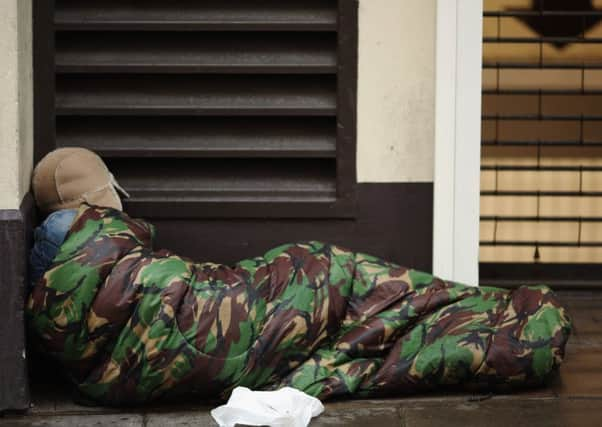Phil Cox: Statistics belie crisis of homeless veterans


Despite recent statistics showing a modest fall in those who officially register as homeless in Scotland, all the politicians on the panel conceded that growing numbers of people appear to be living and sleeping on our streets and that more in-depth research is required to better understand the true extent of the problem.
Official Scottish Government statistics show a one-third decline in the overall number of homeless applications since 2009-10. This includes specific figures showing that 925 homeless applications were submitted by ex-military personnel in the last financial year ending March 2015, a modest drop from 965 the previous year. Meanwhile, the number of veteran applicants who were assessed as priority homeless fell from 795 in 2013/14 to 730 in the last year.
Advertisement
Hide AdAdvertisement
Hide AdWhile organisations like Shelter and the Scottish Housing Regulator are best placed to assess the overall position in Scotland, what my organisation is experiencing on the ground certainly does not match what these official statistics are telling us.
We are seeing a rise in demand for our services. Over the past year we provided accommodation for 228 homeless veterans compared with 168 in 2014.
As a charity committed to working with our residents in order to help them turn their lives around, which includes getting them out of the temporary accommodation we provide and into secure tenancies, our figures are partly an indication of the success we’ve had in moving veterans on.
However, taking into account the concerns expressed both by politicians and housing organisations on the true understanding of homelessness in Scotland, it does highlight that significant challenges lie ahead.
It’s important we recognise that veteran homelessness is an enduring issue rather a new phenomenon. We had former soldiers and sailors living on our streets when Scottish Veterans Residences was founded in 1910 and, more than a century later, we continue to see homeless veterans living in communities throughout Scotland and the UK.
There are a number of reasons for this, including relationship breakdown, the struggle to find post-military employment, discharge from hospitals or prisons and financial difficulties leading to mortgage or rent arrears. Psychological complications affecting some who have experienced duty in conflict zones can be another factor.
While there have been major strides forward by government in trying to measure the scale of the problem, we have always believed that these official figures under-represent the true numbers as many homeless veterans fall below the radar, never appearing on any formal register and, as a result, they often fail to get the help they need. One of the reasons for this is that people who are nurtured within the military culture, based around discipline, responsibility and self-reliance, often feel ashamed to ask for help.
Another reason for the discrepancy is the government’s Housing Options model, which aims to help people before they make a homeless application. One consequence of this well-meaning approach is that it enables local authorities to divert individuals from being formally assessed. This could lower the numbers officially assessed as homeless without bringing about any real change on the ground.
Advertisement
Hide AdAdvertisement
Hide AdRegardless of the outcome of next week’s Holyrood elections, the main parties all appear to agree that homelessness is an issue which is worthy of greater scrutiny. As we heard at the SFHA hustings event, there is a political consensus that more needs to be done to address this issue.
From our perspective as a charity supporting UK veterans in Scotland, we hope that over the course of the next Scottish Parliamentary term this consensus will open the door to greater understanding and transparency on the true extent of homeless and how it can be tackled most effectively.
Phil Cox, who served 32 years in the RAF, including tours in both Afghanistan and Iraq, is the CEO of the charity Scottish Veterans Residences